On this year’s Martin Luther King Jr. Day holiday, it is tempting to lament the deteriorating state of race relations in the United States.
When it comes to ebbing racial comity, those seduced by the allure of casting blame on the present generation for the last generation’s failings are not without supporting evidence.
According to Gallup, 72 percent of non-Hispanic whites and 66 percent of black respondents told pollsters that race relations were “very good” or “somewhat good” as recently as 2013. By the end of 2014, however, Americans again began to regard race relations as a major problem. Today, according to Gallup (which has been polling on the issue of race consistently since 1963), Americans regard tension between the races as one of the most serious challenges facing the nation.
In January of 2014, 55 percent of all Americans were “very” or “somewhat” satisfied with the state of race relations. One year later, only 30 percent of respondents said the same — a 25-point collapse in the space of just 12 months.
Americans who claim that racial tensions are nearing all-time highs see the evidence for this assertion all around them. 2014 was a year marked by racial conflicts that exploded onto the streets across the country. In August, Attorney General Eric Holder, who had previously called America a “nation of cowards” when it came to the issue of race and implied that his and the president’s critics were motivated by the fact that they are “both African-American,” descended on the strife-ridden city of Ferguson, Missouri to blame that city’s discord on the legacy of racism.
“The world is watching because the issues raised by the shooting of Michael Brown predate this incident,” Holder said. “This is something that has a history to it, and the history simmers beneath the surface in more communities than just Ferguson.”
When a Staten Island grand jury failed to indict the officer responsible for the death of Eric Garner, New York City Mayor Bill de Blasio mirrored Holder and poured gasoline on the city’s smoldering angst. He, too, claimed that the legacy of American racism had played a role in the grand jury’s decision. “We are dealing with centuries of racism that have brought us to this day,” the city’s mayor said just hours after the decision was released. “It’s a phrase that should never have to be said, it should be self-evident, but our history requires us to say that black lives matter.”
This agitation achieved its desired effect. Both these statements did nothing to heal racial wounds. To the contrary, the violence and civil disobedience that followed these irresponsible pronouncements exceeded anything that had preceded them.
It is undoubtedly true that American racial anxieties are waxing, and that is nothing to celebrate. There is, however, reason for optimism about the future of race relations in the United States. Racial progress in America comes in fits and starts, and the trajectory of interracial affairs over the course of the last half century has been a positive one.
When respondents were asked “do you think that blacks have as good a chance as white people in your community to get any kind of job for which they are qualified?” in 1963, just 39 percent said they did. 48 percent disagreed. By June of 1978, the public had determined that job discrimination was virtually a non-issue. 67 percent of respondents agreed that African-Americans could access all the opportunities for which they were qualified. Only 24 percent did not agree.
In 1968, nearing the close of a decade marked by racial violence in the streets of places like Watts, Baltimore, Washington D.C., and Harlem, 11 percent of Americans told pollsters that race or race relations were the single most important issue facing the United States. America’s racial fears would never be that high again until 24 years later in 1992, when the verdict in the trial of police officers responsible for the beating of Rodney King again sent America into paroxysms of self-doubt regarding racial progress. Then, 15 percent of the public said that race relations were the most important issue facing the nation. Today, Americans are again gravely concerned about the state of racial progress; 13 percent of the public regards racial anxiety as the biggest issue facing the country. But few are making note of the 22-year gap between racial crises. In the interim, no more than 4 percent of the public told pollsters that racial tension was their most pressing concern.
The verdict in the O.J. Simpson case also sparked a “national conversation” about the state of race relations. In 1995, only 32 percent of the public said that civil rights for blacks had “greatly improved” and 51 percent agreed that civil rights had improved only “somewhat.” That proved to be a fleeting response to an acute crisis. By August of 2011, 50 percent said that civil rights had “greatly improved” for blacks while 39 percent agreed that they had improved “somewhat.” In that same year, 52 percent of the public said racial tensions would “eventually” disappear entirely. In 1995, only 29 percent agreed with this statement. At the beginning of Bill Clinton’s second term in the White House, another 68 percent told pollsters that racial anxiety would be with us forever.
While Americans’ perceptions are subject to the whims of the news cycle, tangible and concrete examples of racial progress are more immutable. Outcomes are also improving for African-Americans. The 2010 census found that, while they are less likely to receive a degree than other groups, blacks were more likely than any other demographic to receive some college education. Though economic disparity among the races is frustratingly persistent, a study conducted by the National Bureau of Economic Research found that metrics associated with “well-being” show that racial gaps are closing.
“In the early 1970s data revealed much lower levels of subjective well-being among blacks relative to whites. Investigating various measures of well-being, we find that the well-being of blacks has increased both absolutely and relative to that of whites,” the study’s abstract summary read. “While a racial gap in well-being remains, two-fifths of the gap has closed and these gains have occurred despite little progress in closing other racial gaps such as those in income, employment, and education.”
Despite the best efforts of a class of professional agitators, racial progress is quantifiable. That is not to say that racism is not an issue, racial progress is never stifled by its adversaries, or that racial disparities have entirely disappeared or perhaps ever will. There are persistent inequalities of outcomes among the races that should anger every American, and many of them are perpetuated by a cast of well-meaning public servants in Washington. Perhaps perfect racial equality and harmony is a utopian goal that will never be achieved. But those who contend that race relations have not improved with historically atypical alacrity lack the evidence to support this contention.
On this MLK Day, celebrate the progress America has made in righting past racial wrongs. If history is any guide – and it always is – the current sorry state of race relations is just a speed bump on a long road toward progress and reconciliation.








Join the conversation as a VIP Member